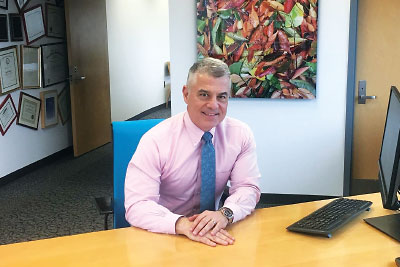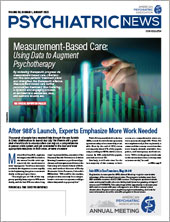Many trainees start their residencies harboring hopes of the good they will do as psychiatrists but become disheartened over time, said Muniza Majoka, M.B.B.S. Yet the APA/APA Foundation (APAF) Diversity Leadership Fellowship reminds them of what a huge difference they can make, inspiring them to do even more, said Majoka, who was the 2021-2022 APA/APAF SAMHSA/Diversity Leadership Fellowship Program chair.
Now, 10 new fellowship slots will be available for trainees interested in getting hands-on experience serving communities that are all-too-often overlooked, thanks to a $230,000, two-year grant from the Sozosei Foundation. The philanthropic arm of Otsuka Pharmaceuticals, the Sozosei Foundation has a primary focus on eliminating the criminalization of mental illness.
The grant will be used to create the Community Diversity Fellowship so 10 fellows can participate in a field component, as well as the other Diversity Leadership fellowship offerings, said APAF Executive Director Rawle Andrews Jr., Esq.
“A lot of our patients face problems with incarceration, not having appropriate access to care and facing various social determinants of mental health,” Majoka said. “Grants like this, which increase the availability of training for the new generation of psychiatrists to provide better care for underserved populations, are extremely encouraging.”
APA/APAF’s Diversity Leadership Fellowships provide mentorship to fellows; provides stipends to attend professional meetings; and provide opportunities to gain leadership experience serving on APA’s councils, committees, and workgroups. They also allow fellows to develop relationships with a diverse group of peers who have similar career interests and goals.
“We are doing something right whenever we capitalize on an opportunity to encourage the next generation of psychiatrists to get involved with APA and advocate for our patients,” said APA President-elect Petros Levounis, M.D., M.A. “Fellows will sharpen their skills in research, public speaking, and administration—skills that will help them become the leaders of our future. But beyond that, the experience will also instill in them a deeper love for psychiatry as they work closely with people who have dedicated their lives to our patients and our profession.”
Fellows will be matched with a host site where they can receive hands-on experience in psychiatry in a community-based setting, providing culturally competent care to underrepresented populations. APAF is in the process of selecting host sites, such as the HOPE Center in Harlem, which seeks to minimize the stigma around communities of color when seeking mental health services (“
Partnership Between Psychiatrists, Faith Leaders Untapped Key to Expanding Reach of MH Care”).
Levounis was awarded an APA Minority Fellowship while he trained in addiction psychiatry at New York University. He conducted a research project on homeless people who have substance use disorders and other severe psychiatric disorders. “I can say that this experience was the springboard for my engagement both with academic psychiatry as well as advocacy,” he said.
“People with mental illness have been discriminated against, disenfranchised, and stigmatized,” he continued. “Just by being a psychiatrist, we have the added responsibility to fight for our patients.”
“For many people, adverse childhood experiences [ACEs] create a slippery slope,” Andrews said. “They find themselves trapped as they grow up, and they cannot break what has become a vicious cycle of overincarceration. We also know that instances of depression and anxiety continue to rise at alarming rates. When mental health problems arise, many families don’t know what to do or they are leery about the financial costs, so they suffer in silence. We believe that our community psychiatrists have a more complete, holistic view of what is happening inside the homes in our communities, and grants like these grow the capacity to help many more community members take the first step toward well-being.” ■

